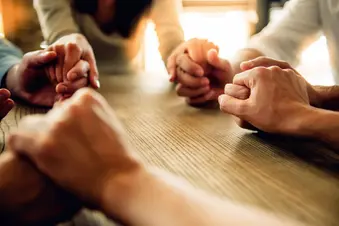
Having bipolar disorder -- and the depression that comes with it -- can feel isolating. Others in your life may not understand what you’re going through. Support groups can help you feel less alone.
About 1 out of 40 adults in the U.S. live with bipolar disorder. Even though it’s less common than anxiety and depression, it’s the sixth leading cause of disability worldwide.
Through support groups, you can meet people from your community who may share some of your experiences. You can also learn from them about mental health professionals and services in your area. They may have tips and advice to help you better manage your bipolar depression.
How Support Groups Can Help
They can help you do better overall. They’re a good place to talk about what you’re going through and discuss medication side effects, treatment options, and self-care strategies. Studies show they also increase your overall well-being.
Bipolar disorder is a mental health issue that can carry a stigma in some circles. When you’re part of a group where having it is the norm, it helps break down that stigma so you’re more comfortable talking about your symptoms and challenges.
Studies show people with bipolar disorder who take part in support groups have fewer and less severe symptoms and number of crises. They can be an important part of your treatment plan.
In fact, being in a support group can be as helpful as getting costly interventions by mental health and social work professionals, research shows.
You may also begin to feel some appreciation for your disorder. Support groups help build self-confidence and self-worth.
Types of Support Groups
What you get from your support group will depend partly on the type of group it is. Some meet in person, while others are online. You might choose one led by others with bipolar disorder or one led by a counselor or other mental health worker.
Some groups are primarily for emotional support and connection, while others offer educational sessions with newsletters, lending libraries, and events in addition to meetings. Others have mental health professionals on staff you can contact.
You may find it empowering to get involved with groups that offer opportunities to participate in mental health legislation and advocacy.
Remember that although these are good places for connection, education, and support, they’re not a replacement for professional treatment for your bipolar disorder.
Support Group Options
These groups are a good place to start as you explore support:
DBSA support groups. The Depression and Bipolar Support Alliance has both in-person and online peer-led support groups across the country. These are volunteer-run, but some also have professional advisors such as psychiatrists, psychologists, nurses, or social workers from the community as resources.
Inspire by Mental Health America. This online support community for people with bipolar disorder is available 24/7. It’s free to register, and all content is reviewed by moderators. Once you’re a member, you can message the community, take part in discussion threads, and “friend” other members.
NAMI Connection. Although they’re not specifically about bipolar disorder, the National Alliance on Mental Illness (NAMI) offers weekly in-person support group meetings for people living with mental illness.
How to Choose the Right Group for You
Before you join, think about what you’re comfortable with, what you need, and what you hope to get out of a support group. Some questions to consider are:
- Do you want to be able to meet in person?
- Do you want support that’s available 24/7?
- How often do you want to meet?
- Do you want access to professionals as part of your support group?
- Is it important to you that your group be led by a professional, or do you prefer peer-led?
You can try more than one as you search – and even stick with more than one if you find different types of support helpful.
Show Sources
Photo Credit: vadimguzhva / Getty Images
SOURCES:
Mental Health America: “How common is bipolar disorder?”
Faculty of Science, Medicine and Health Papers: “The effectiveness of support groups: a literature review.”
American Journal of Community Psychology: “Mutual help groups for mental health problems: a review of effectiveness studies.”
Depression and Bipolar Support Alliance: “Chapters and Support Groups.”